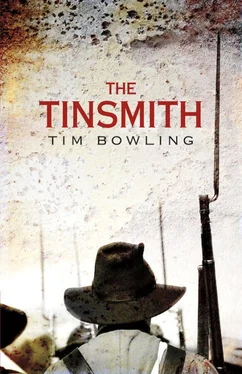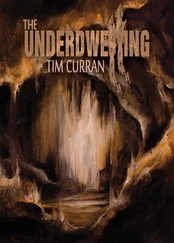He hummed a little as he worked, forgetting all about the temporary employee approaching over the battlefield. Only, at a subtle sideways glance, Greaver saw that it wasn’t one of his hired men; it was a Union soldier he’d never seen before, a very tall one. Greaver shrugged inwardly and returned to the corpse. Finding its blood flush in the cheeks satisfactorily low, he rubbed his hands on a cloth, pretending a greater busyness than was required. He did not yet address the man standing a few feet away, who had just lowered a body to the ground. Instead, Greaver took the captain’s few personal effects—some letters, a college ring, a small photo of a child—and placed them in an open, zinc-lined coffin. Taking a pencil stub out of his vest pocket, he carefully wrote the deceased’s name on the lid, along with the address of his parents—somewhere in Pennsylvania, this one—not too far to travel, as the crow flies. Greaver intended to lift the captain and place him in his coffin, just to gain a further advantage by making the newcomer wait. But the man’s stillness disarmed him; the soldier just stood above the body, gazing at Greaver with unblinking, bulging eyes. Usually, if you made a prospective seller wait long enough, you established more authority when it came to prices, but Greaver had a good instinct for people—living and dead—and this seller wanted something more than money. Even so, Greaver had a very intimate relationship with time, and no man had the power to hurry him.
He stepped over to the corpses on the ground and picked out the next one for the table. Wearily thinking of how much he’d have to sweat to lift the corpse onto the table, he decided to approach the tall soldier instead. Before speaking to him, Greaver noticed the stripes on the uniform of the corpse the tall soldier stood over. In fact, Greaver noticed the stripes even before he noticed the grey fabric surrounding them.
“A Reb colonel,” he said, unable to keep the impressed tone out of his voice. To mask it, Greaver lowered himself stiffly to his haunches and considered the old, white-whiskered face. It would be a pity to trade such a noble corpse back to the Rebels. Perhaps it would be worth the risk to do the embalming himself and find some way to recover his fee from the family—no doubt they’d appreciate Greaver’s skills more than most, given the regal bearing of their patriarch.
The embalmer stood, straining with the effort. Suddenly the sky darkened as clouds scudded across the sun; the air tasted of rain. Greaver lowered his eyes and the same unblinking gaze burned into him. The soldier was well over six feet and wore a uniform tight across his broad chest and shoulders. The uniform was torn in many places, like the shirt of a scarecrow that hadn’t scared off many crows. The powder burns were so thick on the soldier’s face that they almost seemed the beginning of a beard, and one of his cheeks was roughly scraped. And he was young, perhaps twenty or so. Only he didn’t seem young at all. He gave the impression that he’d been walking battlefields to sell corpses ever since the beginning of time. Greaver shuddered as the soldier nodded toward the corpse at his feet and said, “I’ll trade.”
Trade? Greaver scowled. What on earth did the man mean by trade? Perhaps he had lost his wits in the fight. Best just to humour him.
“Put him on the table,” Greaver said.
The soldier picked the body up as if it was a sack of dust and placed it on the planks. Then he stood by as Greaver made a closer inspection. The colonel’s hand, when held to the light, was most intriguing—the inner flesh of the fingers had not turned opaque yet. The embalmer reached into his vest and removed a small mirror; he positioned it over the colonel’s mouth. No breath blurred the glass. Greaver pressed his ear to the colonel’s chest. Nothing. He must have taken his time dying, since the battle had ended almost two days ago now.
“Freshly dead.” Greaver narrowed his eyes at the soldier. As the man seemed too dense to understand the implication, Greaver added, “ Very freshly.”
The soldier’s blank expression did not change. His arms hung loosely at his sides. Greaver noted the large hands—they twitched every few seconds. They were obviously hands that could do great damage. But, after all, what did it really matter how the colonel had died? If this soldier had finished him off, he’d probably just done the Rebel a favour.
“I can give you a dollar,” Greaver said.
The soldier’s upper lip curled slightly. He shook his head and spoke in a deep, anxious voice.
“Have you… did anyone bring in a body, not a soldier… it had been cut.”
Greaver glanced over the battlefield. He might require Tomkins’s assistance if this soldier’s madness turned violent.
The soldier placed his twitching hands near his groin. He stammered. “Cut here. Cut off.”
“Well, now…” Greaver pushed his glasses back up the bridge of his nose with one plump forefinger. “I don’t recall such.” He turned his head slowly toward the dead colonel. “But this one. Even though he’s not one of ours and I might not be able to collect on him, I can offer you two dollars.” Perhaps the thought of money would bring the soldier to his senses. After all, even a madman needed to live.
When Greaver turned his head back, he almost struck the soldier’s chest. The man had moved closer. His huge eyes narrowed. And as they kept narrowing, they seemed to shut out the light. But it was only the sky doing that, the dark clouds suddenly stalling overhead.
“A hard bargainer, sir, very hard.” Greaver attempted a smile as he fished in his leather purse for a more appropriate bill. “But I won’t say unfair. A colonel’s a colonel, and worth the price.” He couldn’t keep a quaver out of his voice. The soldier stood so close that Greaver could smell him—sweat and earth and… chloroform? Unmistakably so. What did this mean? Was he out walking the battlefield, poisoning the wounded?
Inwardly, the embalmer gave another great shrug. He had seen much that did not reflect well on the human species. And, in truth, he could not say chloroforming wounded men to death might not be a kind of mercy.
The first drops of rain fell. Greaver passed the money to the soldier, who took it and stared at it in wonder. Then he let it fall to the ground. “Are you sure?” he said. “A man with small eyes and red hair all around his face? Grinning?”
Despite his apprehension, the embalmer could not repress a chuckle. A grinning dead man? But his mirth passed quickly. He turned his chuckle into a cough and scanned the field for Tomkins.
The soldier’s lips parted slowly. His tongue slowly crossed over his large top teeth. The sight made Greaver even more uneasy. He stepped back, cleared his throat, and said, “I pay only for soldiers. No one else.”
The tongue stopped, vanished.
Then the soldier fixed his gaze on the metal canister filled with the captain’s blood. The rain continued lightly. From the distance came the singular retort of a rifle, which oddly extended into the barking of a dog. But Greaver listened only to the light tap of raindrops on the metal canister; water joining water, he thought soberly, wishing the soldier would go away, wishing he had said he wasn’t buying any more bodies, coupons or no coupons. Not from this man. Greaver couldn’t understand his energy. The energy of the dead, though also mysterious, at least belonged to some other realm. He did not confront it except to stay the mortal rot with herbs stuffed into orifices and mercury shot into vessels. And he did not like to confront the enemy of any living thing he could not read as easily as a corpse.
Without another word, the tall soldier backed off. His departure seemed to take the rain away. For the light drops ceased to fall. Greaver shivered the whole length of his body as he watched the soldier break into a loping run and shrink to a black mark near the distant woods. Then the embalmer removed his glasses and wiped the sweat from his forehead. At last he returned to the regal body stretched out on the planks. A few raindrops had settled in the wrinkles below the slowly sinking eyes. Horace Greaver was not a fanciful man, but he couldn’t shake the idea that the Rebel colonel was crying.
Читать дальше












